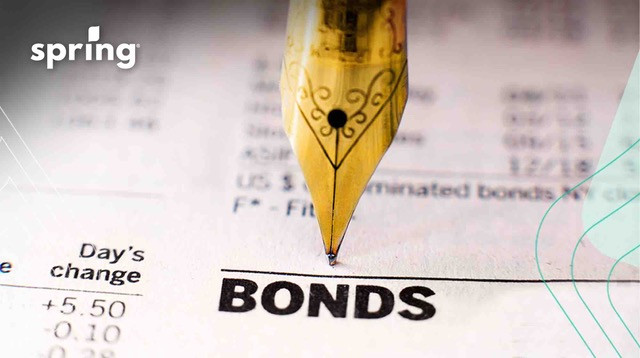You may have heard of them, usually lumped in under stocks: stocks and bonds. While that is how they are referred to, they are actually different from stocks. Simply put, stocks allow you to own a portion of a company, and with bonds, you are essentially only lending a company money.
What are Bonds and How Do They Work?
Since bonds are essentially a loan instead of buying into shares, the company’s profit margin doesn’t affect your return. You are lending the company money that they pay back with interest, ensuring some return on your investment. Essentially, bonds are a way for companies to raise funds.
Unlike stocks, bonds are much lower risk. Especially if you hold onto the bond until maturity, for this reason, they are considered to be the most common form of a fixed-income security. Fixed income securities are also known as fixed income instruments.
The thing with bonds is that there is also a set date by which the amount is to be paid back to you. When it comes to the interest payments, in most cases, bonds pay twice per year, but that can vary depending on the bond that you purchase.
Since bonds have fewer risk factors with return than stocks, you may be wondering why some still choose to invest in stocks. Well, that is because there is potential for a much higher return with stocks. Also, with stocks, you own shares in the company, so you can have some input as a shareholder.
Most investors will invest in stocks as well as bonds. Since bonds are less risky, they are a good investment for diversity. They are also a great way to earn some passive income.
What Kind of Bonds Can You Purchase in Canada?
In Canada, there are multiple types of bonds you can purchase. Just to name a few:
- Government of Canada bonds: These bonds are issued by the federal government and are considered to be the most stable bonds to purchase. This is because the government is timely with their payments, whether they are principal or interest payments. This is important for investors looking to generate consistent cash flow.
- Municipal bonds: This type of bond is issued by a local government or municipal finance authority.
- High-yield bonds/junk bonds: These are corporate bonds that represent debt. These bonds promise to pay interest as well as the full principal at the time of maturity. The maturity date depends on the individual bond.
- Investment-grade corporate bonds: Investment-grade bonds have a lower risk of default, meaning that they are a safer investment.
- Strip coupons and residual bonds: The coupons are interest payment coupons that are separated from government bonds. Residual bonds are bonds without interest coupons. These types of bonds are sold at a discount; however, they do mature at face value.
- Provincial bonds: These bonds are also considered to be secure investments because they are sold by provincial governments. Provincial and municipal bonds are the same in this sense.
Ways to Purchase Bonds
When it comes to bonds, there are two ways to purchase them. The first way is to purchase a single bond directly from a broker. We mentioned above that this would likely be a financial institution or a licensed financial advisor. That being said, there is a more accessible way to purchase bonds.
In Canada, instead of investing in one singular bond, you can also invest in a bond fund or bond ETFs. There are also bond mutual funds. These can be purchased through any bank or brokerage as well, and are different corporate and government bonds already put together into a profile.
They come as short-term and long-term, and you can choose how many shares you want to purchase. Since these funds, ETFs and mutual funds tend to be less risky, many investors also choose to add these to their portfolio.
How to Purchase Bonds through Canadian Banks
Buying bonds in Canada is actually pretty simple. You can either purchase them through a bond issuer, which would be a private brokerage, through financial institutions or through a licensed financial advisor. The process itself depends on where you are purchasing them. Keep in mind that you can also purchase foreign bonds the same way, not just Canadian bonds.
With any of these bond issuers listed below, you can also purchase bond funds, mutual funds and ETFs.
TD
In Canada, TD offers a few different types of bonds, including government and corporate bonds. They are sold as fixed-income investments along with GICs and money market instruments. When it comes to investing with TD, you can start your account directly online.
After that, you can transfer the funds into the account with the online bill payment or funds transfer feature. Once that is done, you can start building an investment portfolio. You can also call in to set up an appointment to create an investment account.
Royal Bank
The Royal Bank of Canada, RBC, has one of the largest inventories of bonds. Depending on the bond you purchase, there will be a commission fee of anywhere from $25 -$250. This is included in the quoted price. Unlike TD, with RBC, you need to book an appointment in order to open an account. You can book this appointment directly online, though.
Scotiabank
You can also purchase bonds from Scotiabank with Scotia iTRADE. They have a wide variety of inventory and advertise their transparent prices with no markups or hidden fees. With Scotia i trade, you can open an account directly online and start creating your portfolio.
CIBC
Using CIBC Investor’s Edge is another way to purchase bonds. Using this platform, you either select Fixed Income Quick Picks or Buy Bonds. Fixed Income Quick Picks allows you to search for bonds based on the type of bond and years till maturity. Using the Buy Bonds feature, you can do a more advanced search. This includes searching by:
- Fixed Income Type
- Face Value
- Term Range
- Yield Range
BMO
With BMO, there are three different types of bonds that you can invest in: treasury bills, money market and coupons and residuals. In order to start investing, you can call or book an appointment online.
Wealthsimple
Wealthsimple offers a wide variety of investments to choose from. The great thing about Wealthsimple is that you can create your account and start building your portfolio completely online. They are also commission-free and offer $0 trades.
That being said, if you are an active trader or day trader, you can get a paid version of Wealthsimple that costs only $100 per month and is recommended if you trade more than $550 per month in USD.aid version of Wealthsimple that costs only $100 per month and is recommended if you trade more than $550 per month in USD.

Savings Bonds in Canada
In 1939, Canada first introduced bonds. These were known as victory bonds. These remained until 1945 and were used to fund the war. In 1946, Canada introduced the Canada Savings Bond program as well as the original Canada Payroll Bonds program. In 1996, the new payroll savings program was introduced. In 1997, the Canada RSP and the Canada RIF were introduced.
While these programs used to be available, you can no longer purchase them. The RSP and RIF became unavailable in 2010. The CSB and CPB were available to purchase as of November 2017. That being said, though, if you had purchased any of these before they were unavailable, you could still hold them until maturity. As of December 2021, all CSBs and CPBs should have reached maturity and be able to be redeemed.
In order to redeem any Canada Savings Bonds or Canada Payroll Bonds, you just need to show your certificate to your financial institution.
Best Bonds to Purchase in Canada
When it comes to purchasing bonds in Canada, the most recommended bonds to purchase are bond ETFs. They work similarly to traditional bonds, and all interest payments that you earn are deposited directly into your brokerage account.
Like traditional ETFs, there are management fees as well as operating costs that are included in the ETF’s MER (Management Expense Ratio). They can also be found on the stock market.
Here is a list of the top 5 bond ETFs in Canada.
1. iShares Core Canadian Universe Bond Index ETF (XBB)
This is a BlackRock iShares Canada ETF. It is listed on the TSX (Toronto Stock Exchange) and is a low-cost, fixed-income ETF. It provides exposure to the investment-grade bond market. The reason this is such a highly rated fund is that it is low risk and consists mostly of government bonds. It also has a relatively low MER of 0.10%.
2. BMO Aggregate Bond Index ETF (ZAG)
As you probably guessed, this is a BMO Canada ETF that also trades on the TSX. This ETF tracks the FTSE Canada Universe Bond Index. It also provides exposure to the aggregate Canadian investment-grade bond market. This is a high-yield bond ETF with a lower MER of 0.09%.
3.Vanguard Canadian Aggregate Bond Index ETF (VAB)
This is another bond ETF that trades on the TSX. This particular fund was designed to track the Bloomberg Global Aggregate Float Adjusted Bond Index and provide exposure to public investment-grade Canadian bonds. This fund also has a lower MER of 0.09%.
4.Vanguard Canadian Short-Term Bond Index ETF (VSB)
This ETF has been around since 2011 and trades on the TSX just like the others we have listed. Unlike the other bond ETFs on this list, though, this Vanguard ETF is designed to focus on government bonds in Canada that have a maturity that ranges from 1 to 5 years. The MER on this fund is 0.11%.
5.iShares Core Canadian Short Term Bond Index ETF (XSB)
This particular ETF is known for its low volatility and high distribution payouts because the bonds mature within 1-5 years. This is why it is often held as a long-term investment. The MER on this bond is 0.10%.
I Bonds in Canada
I bonds are a type of US savings bond. The reason investors purchase these is that they are designed to protect the value of money from inflation.. While I bonds are US bonds, Canadians are able to purchase bonds from the U.S. Treasury. That being said, they can also be purchased through ETFs.
Are Bonds a Good Investment?
Whether or not bonds are a good investment is up to you. That being said, they are less risky than purchasing stocks. However, there are some things that you should consider before you decide if investing in bonds is right for you.
Advantages
The good thing about bonds is that a lot of them are government bonds. This means that they are low risk and you are less likely to lose your money. They are also fixed income, so you usually see a biweekly or monthly return.
This gives you a steady income, which isn’t always likely when you are investing in stocks. Another great advantage to bonds is that you can purchase them as ETFs instead of just individual bonds. This means that you can invest them in RRSPs and TFSAs in some cases.
Disadvantages
It is important to remember that because bonds are a safer form of investing, they have lower interest rates. This means you are likely to make less money off of them, but you are also less likely to lose.
Inflation is also something to consider when investing in bonds. In some cases, there is an interest rate risk, and your rate of return may not beat the rate of inflation. This means that you could not make as money as you would if you put the money into a different form of investment.
You should also keep in mind that there are higher-risk bonds. These are often lower-quality bonds with a higher yield.
What Will Replace Canada Savings Bonds
While there isn’t really anything that will replace Canada Savings Bonds, now that they’re no longer being sold, there are replacements. You can get Treasury Bills, Guaranteed Investment Certificates, government-backed High-Interest Savings Accounts, Tax-Free Savings Accounts, and money market funds.
Typical Return of Bonds in Canada
How much you can get in return on your bonds depends on the frequency of your regular interest payments, or when you choose to sell the bonds. Your bond yields also depend on how many you have and how long you choose to hold them for. This will greatly affect the interest income. The bond’s maturity date also makes a big difference.
The type of bond that you have also makes a difference. Strip bonds, also known as zero-coupon bonds, accrue interest differently from other bonds. There’s also the inflation risk to consider, as well as market prices and asset classes. These can all affect what you’ll earn. Earning somewhere around 3% isn’t outside of the norm for bonds, though, since they’re relatively low-risk.
Can Bonds Be a Risky Investment?
The fact is, bonds can be a risky investment. With how bonds work, you may not find your traditional investment risks, but they exist. The first thing that can impact bonds is economic conditions, like inflation and interest rate changes. If bond prices and interest rates rise after you get your bond, you could be missing out on predictable income. In this case, you could lose money, but a diversified portfolio can help to mitigate your risk.
Another risk with bonds is default risk. In this case, the bond issuer defaults on the bond and is unable to make the interest payments or repay the principal amount. The largest risk of this happening is with corporate bonds and companies that have a larger credit risk. However, as long as the issuer pays, you’re okay.
When holding bonds, even if you receive interest payments, the issuer’s credit ratings are a big deal. This can lower the market value of the bonds issued and cause you to lose money. Some other risks are liquidity, reinvestment and even call risks. If the bonds aren’t traded frequently, this can make them hard to sell at a fair price. If the rates drop, reinvesting your funds can also cause you to lose money. There’s also a risk of it being called, meaning that it gets redeemed before it matures.
Using Bonds for Retirement Income
When it comes to using bonds for retirement, some fund managers recommend investing them in Registered Retirement Savings Plans. You don’t have to pay taxes on accrued interest and capital gains until you start using the funds for retirement income. While these can be used for a variety of debt securities, including exchange-traded funds, bonds tend to be overlooked for retirement income.
When it comes to bonds and retirement, getting investment advice from investment firms or other investment professionals is a good idea. They can help you with existing bonds, bond sales, and even secondary markets. They can even help you borrow money from existing funds to raise money for others.
Final Thoughts
While you could get bonds from central banks, and still can in the US, there are all sorts of different types of bonds in Canada. They’re low risk, can help you save for the future, and are a great way to diversify your portfolio. In fact, many choose to save bonds in both TFSAs and RRSPs for their retirement.
While the government of Canada no longer offers Canada Savings Bonds, you can still redeem them. While they stopped accruing interest in November of 2021, they can still be redeemed for their latest value. In fact, there are still plenty of savings bonds out there that need to be redeemed.








